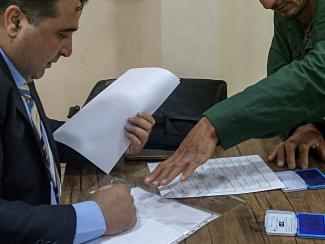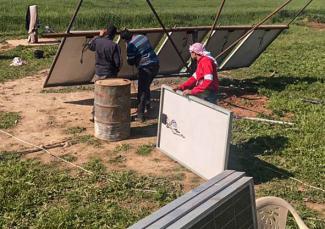Earlier this year, USAID partnered with the Near East Foundation (NEF) to provide financial literacy information sessions and to distribute micro-loans worth up to $2,000 to 104 farmers. In total, USAID provided $130,700 in micro-loans to eligible borrowers.
Here are some ways these loans are helping Syrian farmers:
Water conservation: Farmers invested in new water pumps and hoses to minimize water usage. One farmer invested in an efficient sprinkler irrigation system and reduced water usage by as much as 20 percent. The switch to efficient irrigation systems comes at a crucial time when much of Syria is suffering water scarcity due to severe drought conditions.
Solar energy: Nearly two dozen farmers used micro-loans to invest in solar energy systems, with expected annual savings of up to $2,000 per hectare for their farming business. Solar energy systems move away from “dirty” diesel-gas generators and can provide clean, consistent power for businesses. Damaged civilian infrastructure from the fight against ISIS is often cited as the biggest barrier to operating a business in northeast Syria. The switch to solar energy is also promoting sustainable farming practices and reducing the environmental impact of the agriculture sector.
Eco-friendly fertilizers and crop nutrients: Farmers used micro-loans to invest in natural, locally-sourced fertilizers and nutrients for their crops. Prolonged conflict and severe drought conditions are worsening an already dire food security situation in northeast Syria. By using modern and eco-friendly farming practices, beneficiary farmers harvested 75 percent of their fresh, high-value vegetable crops, a 20 percent increase in their harvest yield compared to last year! USAID assesses these yields will generate $1 million in additional income for beneficiary communities, in addition to improving access and affordability of food.
USAID’s partnership with NEF is part of a broader effort to support local Syrian businesses to improve business operations, attract private sector investment, and create an enabling environment for economic growth. This is often centered around developing new and/or improved management processes within businesses that remove constraints to scalability and long-term growth. These efforts are vital ingredients for stability, job growth, and reducing dependency on foreign assistance in non-regime-held areas of northeast Syria.

Pragma Corp

Pragma Corp
